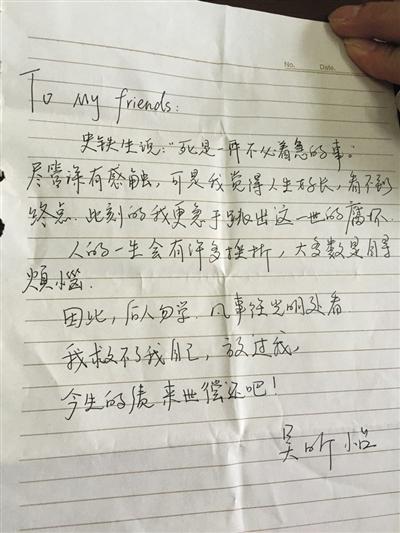


Wu's suicide note (Phtoto/Xinhuanet)
Other incidents and legal recourse
Hepatitis B is one of the most common infectious diseases in China, with 93 million HBV carriers, the Xinhua News Agency reported in 2013. The number of newly infected people reaches 100,000 annually.
"Ignorance generates horror, which results in discrimination. Many people refused all contacts with patients when they are not sure which kind of contact is safe," read an opinion piece run on Friday on news portal gmw.cn.
A survey conducted in five universities in Hubei Province in 2012 by a local NGO dedicated to combating discrimination against HBV carriers revealed that some 58 percent of 2,825 respondents said they know little about HBV while about 53 percent believed the disease was scary, news portal legaldaily.com.cn reported.
The now defunct Ministry of Health, the Ministry of Education and the Ministry of Human Resources and Social Security jointly introduced a policy in 2010, forbidding all medical institutes from diagnosing HBV for employers and schools when organizing health examinations of job hunters and students who are to be enrolled.
Although the central government's anti-discrimination policy against HBV carriers provide them equal access to higher education, universities still lack tangible measures to popularize HBV knowledge among students or offer psychological counseling, Xiong Bingqi, associate dean of the 21st Century Education Research Institute, was quoted by the Beijing Youth Daily as saying on Friday.
"If the school provided Wu a single-room dorm on its own initiative, this constitutes discrimination against Wu and the school should be held responsible for her death. This move also leads to deeper fear and more misunderstanding among students about HBV," Niu Yuliang, who formerly worked for Yirenping, an anti-discrimination NGO against HBV carriers, told news portal caixin.com on Thursday.
"Despite the ban, China has still witnessed widespread discrimination against HBV carriers," Xiong said.
Eight graduates were denied employment by a Chengdu-based subsidiary of Aviation Industry Corporation of China after they underwent health examinations, including HBV tests, Xinhua reported in 2012.
A female employee surnamed Zhang in Beijing, 30, who was forced to resign among colleagues' disgust and discrimination after being diagnosed with HBV in 2012, received compensation worth over 30,000 yuan ($4,800) from its employer on March 2 after filing a lawsuit, Beijing-based newspaper The Mirror reported.
 |
 J-11 fighters in air exercise
J-11 fighters in air exercise Beauties dancing on the rings
Beauties dancing on the rings Attendants-to-be join Mr. & Miss Campus Contest
Attendants-to-be join Mr. & Miss Campus Contest Beijing's toughest anti-smoking law takes effect
Beijing's toughest anti-smoking law takes effect Family lives in cave for about 50 years in SW China
Family lives in cave for about 50 years in SW China PLA soldiers operating vehicle-mounted guns in drill
PLA soldiers operating vehicle-mounted guns in drill Blind carpenter in E China's Jiangxi
Blind carpenter in E China's Jiangxi China hosts overseas disaster relief exercise for the first time
China hosts overseas disaster relief exercise for the first time 20 pairs of twins who will become flight attendants in Sichuan
20 pairs of twins who will become flight attendants in Sichuan Obama is sowing discontent in S.China Sea
Obama is sowing discontent in S.China Sea Rescuers work through night to reach cruise ship survivors
Rescuers work through night to reach cruise ship survivors Driving through limbo
Driving through limbo Facing down MERS
Facing down MERSDay|Week